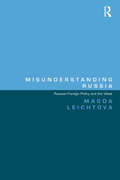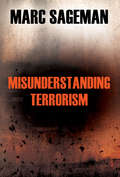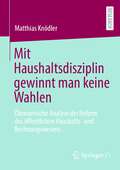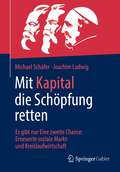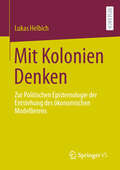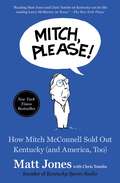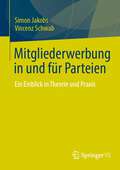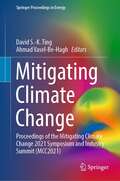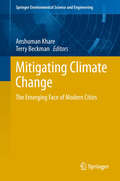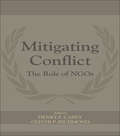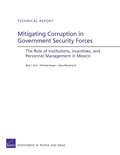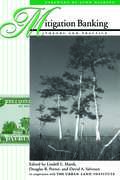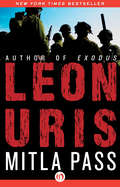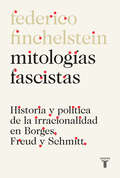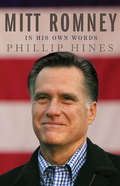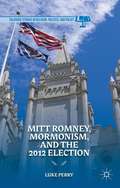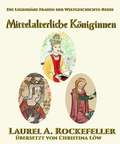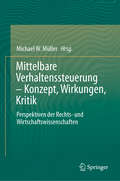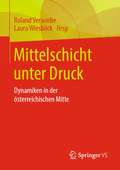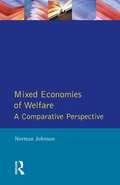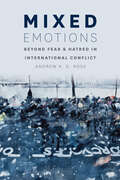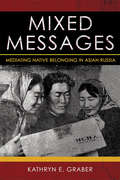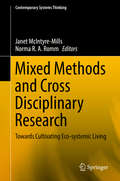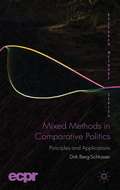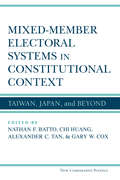- Table View
- List View
Misunderstanding Russia: Russian Foreign Policy and the West
by Magda LeichtovaWell argued and balanced, Leichtova provides an alternative and more constructive understanding of what drives Russian foreign policy. The book is based on the concepts of constructivism and orientalism in international relations to analyse the policies of the Russian Federation. This book highlights that Russian foreign policy is a complex phenomenon constructed from internal as well as external developments, perceptions and expectations. At the same time, it also highlights that Western states are the most significant Other in construction of the Russian foreign policy and even Russian identity and, at the same time, actively create an 'image of Russia' in international politics which is widely based on their own Western assumptions about the country. The author introduces the reader to an alternate portrayal of relations between Russia and the West which all analysts should take into consideration before drawing conclusions.
Misunderstanding Terrorism
by Marc SagemanMisunderstanding Terrorism provides a striking reassessment of the scope and nature of the global neo-jihadi threat to the West. The post-9/11 decade experienced the emergence of new forms of political violence and new terrorist actors. More recently, Marc Sageman's understanding of how and why people have adopted fundamentalist ideologies and terrorist methods has evolved.Author of the classic Understanding Terror Networks, Sageman has become only more critical of the U.S. government's approach to the problem. He argues that U.S. society has been transformed for the worse by an extreme overreaction to a limited threat--limited, he insists, despite spectacular recent incidents, which he takes fully into account. Indeed, his discussion of just how limited the threat is marks a major contribution to the discussion and debate over the best way to a measured and much more effective response.
Mit Haushaltsdisziplin gewinnt man keine Wahlen: Ökonomische Analyse der Reform des öffentlichen Haushalts- und Rechnungswesens
by Matthias KnödlerDas herkömmliche Rechnungswesen der öffentlichen Verwaltung ist die Kameralistik. Diese ist den gestiegenen Anforderungen aus Sicht von Wissenschaft und Praxis nicht mehr gewachsen und wird in Teilen der öffentlichen Hand seit nunmehr zwei Jahrzehnten durch die Doppelte Buchführung (Doppik) abgelöst. Das vorliegende Buch untersucht die Wirkungen dieser Reform auf das Handeln der betroffenen Akteure.Es wird der Frage nachgegangen, ob und gegebenenfalls unter welchen institutionellen Bedingungen das doppische Haushalts- und Rechnungswesen bzw. die darin integriertenInstrumente im kommunalen und staatlichen Bereich den mit der Einführung verbundenen Erwartungen gerecht werden kann. Untersucht werden deshalb die Fragen nach effizienzfeindlichen Institutionen der Finanzsteuerung und deren konzeptioneller Berücksichtigung in der Doppik. Dabei werden die Grenzen der Reform, aber auch die organisationsbezogenen Effizienzpotenziale der Einführung von dezentraler Budgetierung, Zielvereinbarungen und einem auf Quasiwettbewerb beruhenden Controllings theoretisch fundiert nachgewiesen und Lösungsvorschläge abgeleitet.
Mit Kapital die Schöpfung retten: Es gibt nur Eine zweite Chance: Erneuerte soziale Markt- und Kreislaufwirtschaft
by Michael Schäfer Joachim LudwigDie biblische Prophezeiung der Apokalypse droht real zu werden. Das ist den meisten zwar bewusst. Aber die halbherzigen Maßnahmen zur Verhinderung des Untergangs konzentrieren sich zudem „nur“ auf die drohende Klimakatastrophe. Gewaltiges Gefährdungspotenzial haben auch der ruinöse Raubbau an den dramatisch schrumpfenden irdischen Ressourcen und die Vermüllung weiter Teile der Erde. Anerkannte Experten sagen voraus, dass der Kollaps der für das Leben wesentlichen Ökosysteme wie die Weltmeere und tropischen Regenwälder kaum noch zu verhindern ist. Dieses Buch entwickelt eine ebenso radikale wie einfache Formel zur Rettung der Schöpfung. Das "Zauberwort" heißt Kreislaufwirtschaft, wozu auch die Erneuerbaren Energien gehören. Alle Stoffe, die in die Wertschöpfungskette eingehen, müssen nach dem Lebenszyklus der Produkte komplett zurückgewonnen werden. Das wäre für alle bezahlbar, und wir verfügen auch über das nötige Know-how. Was wir brauchen, ist „nur“ ein Verursacherprinzip für die Rückgewinnung und eine Marktwirtschaft, für die wir das Soziale viel umfassender und vor allem einklagbar definieren. Dies wird von den Autoren erstmals theoretisch entwickelt. Dazu präsentieren sie praktikable Vorschläge zur politischen Umsetzung.Schlagkräftige Argumente liefert ein (fiktives) Interview der Autoren mit Papst Franziskus, Karl Marx und Friedrich Engels. Die drei antworten mit Aussagen aus ihren Schriften auf gleichlautende Fragen. Was verblüfft und beeindruckt, sind die großen Übereinstimmungen in den Bestandsaufnahmen und Lösungsvorschlägen.
Mit Kolonien Denken: Zur Politischen Epistemologie der Entstehung des ökonomischen Modellierens
by Lukas HelbichDiese Arbeit analysiert Entstehungspunkte des ökonomischen Modellierens in kolonialen Kontexten zwischen dem frühen 18. und 19. Jahrhundert. In drei Fallstudien rekonstruiert Lukas Helbich die offenkundigen und weniger offensichtlichen Spuren des Kolonialismus in den Verfahren, Formen und Inhalten ökonomischen Modellierens avant la lettre. Ökonomisches Modellieren wurde im kolonialen Kontext eingeübt und erprobt, Kolonien fungierten für die untersuchten Autoren Richard Cantillon, Victor Riquetti de Mirabeau und Thomas Robert Malthus als Proto-Modelle des ökonomischen Modellierens.
Mitch, Please!: How Mitch McConnell Sold Out Kentucky (and America, Too)
by Matt JonesThe New York Times and Wall Street Journal bestseller about how Mitch McConnell has been bad for Kentucky—and why he needs to be voted out of office from the founder of Kentucky Sports Radio and attorney Matt Jones.They say all politics is local. In 2020, Mitch McConnell will have served five full terms as a US Senator. Thirty years. The Senate Majority leader&’s power is as undeniable as it is infuriating, and the people of Kentucky have had enough. Led by Matt Jones, they (and they alone) have the power to oust him from office. How did Jones, a local boy turned attorney turned sports radio host come to shine the brightest light on McConnell&’s ineptitude? Simple—he knows Kentucky inside and out, and has used the state&’s love of sports as an entry point for showcasing how McConnell has failed his fellow citizens both economically and socially for three decades. Entertaining, maddening, yet ultimately inspiring, these stories from Kentuckians in each of its 120 counties illustrate the Senate Majority leader&’s stunning shortcomings. &“Jones employs a sharp, political scalpel eviscerating McConnell…[and this book is] an effective combination of description and vivisection&” (Kirkus Reviews). Jones brings his trademark wit and wisdom throughout the book, while also offering a beautiful portrait of a state with arguably the most untapped potential in our country. Ultimately, the white-hot hatred for McConnell on the coasts is just white noise. Only the people of Kentucky can remove him from office. Here, Matt Jones demonstrates he has the influence, charisma, and institutional knowledge to lead the charge. He and his fellow Kentuckians have had enough—and they&’re ready for a fight.
Mitgliederwerbung in und für Parteien: Ein Einblick in Theorie und Praxis
by Simon Jakobs Vincenz SchwabDas Buch fasst wesentliche Erkenntnisse zur Mitgliederwerbung in Parteien systematisch zusammen und gibt darüber hinaus praxisorientierte Tipps, wie sich Mitglieder optimal gewinnen lassen können. Dabei werden partizipationstheoretische, kommunikationspsychologische und nicht zuletzt linguistische Aspekte berücksichtigt. Die Publikation bietet sowohl einen fundierten Einblick in die Mitgliederwerbung von Parteien als auch eine praxistaugliche Handreichung für alle, die neue Mitglieder gewinnen wollen.
Mitigating Climate Change: Proceedings of the Mitigating Climate Change 2021 Symposium and Industry Summit (MCC2021) (Springer Proceedings in Energy)
by David S.-K. Ting Ahmad Vasel-Be-HaghThis book includes the proceedings of the Mitigating Climate Change 2021 Symposium and Industry Summit (MCC2021), which brings together research from experts in academia, industry, and policy arenas to uncover the challenges, sharpen existing solutions, and formulate cutting-edge means to mitigate climate change. It highlights the need to create sustainable measures at all fronts including adaptation, policy, finance, renewable energy, solar, wind, thermoelectric, green transportation, and sustainable healthcare. This symposium will disseminate the state-of-the-art breakthroughs and promote collaborations to maximize opportunities for innovative solutions.
Mitigating Climate Change: The Emerging Face of Modern Cities
by Anshuman Khare Terry BeckmanWith ever increasing trends in urban consumption and production practices, a call for action to mitigate Climate Change is often seen as a way to foster sustainable development. Considerable attention is now being paid to determine what urban sustainability would include. Today there is a pressing need to broaden our knowledge and apply new concepts and frameworks to development of modern cities. Building on the foregoing, this book attempts to bring together and discuss concepts, tools, frameworks and best practices to cope with the emerging challenges faced by cities today. The book will be of use to policy makers, city planners, practitioners and academics who are starting to project what modern cities would need to do in terms of energy efficiency, mobility, planning and design of habitat and infrastructure and adapting to climate change.
Mitigating Conflict: The Role of NGOs
by Oliver P. Richmond Henry F. CareyThis title examines the roles and new opportunities arising from the increasing participation of non-governmental organizations (NGOs) in peace-making, peacekeeping and peace-building processes, both formal and informal, state-sponsored and unofficial. Drawing on both academic experts and activists, this study brings together contributions from those who have observed how NGOs have sought to reflect civil society concerns, provide humanitarian relief, monitor compliance with international norms and treaty requirements, and disseminate information of concern to advocacy networks.A critical appraisal of the opportunities and constraints of NGOs is provided alongside the examination of the NGOs role in the "new agendas" for peace.
Mitigating Corruption in Government Security Forces: The Role of Institutions, Incentives, and Personnel Management in Mexico
by Nicholas Burger Mary Manqing Fu Beth J. AschMexico has undertaken reforms in recent years to professionalize its police. This report draws on the literature on corruption and personnel incentives and analyzes police reform in Mexico. It addresses the roots of corruption and the tools that could be used to mitigate it and provides an initial assessment of the reforms' effectiveness. The results suggest some progress, though police corruption still remains high and more work is needed.
Mitigation Banking: Theory And Practice
by Douglas R. Porter David Salvesen John De Grove Lindell L. MarshUnder the Clean Water Act, development that results in the permanent destruction of wetlands must, in most cases, be mitigated by the creation of a new wetland or the restoration of a degraded one. In recent years, the concept of "mitigation banking" has emerged. Rather than require developers to create and maintain wetlands on their own on a quid pro quo basis, mitigation banking allows them to pay for wetlands that have been created and maintained properly by others to compensate for their damage.The contributors to this volume provide an overview of mitigation banking experience in the United States, examine the key issues and concerns -- from providing assurances to determining the value of credits -- and describe the practice of developing and operating a mitigation bank. Topics include: history and current experience of mitigation banking policies and concerns of local, state, and federal agencies economics of mitigation banking funding, management, and operation of banks starting a mitigation bank
Mitla Pass
by Leon UrisA writer travels to Israel to research a novel, but he ends up drawn into the Suez Crisis How did Gideon Zadok, an American novelist and screenwriter, end up pinned by artillery shells in Mitla Pass? It was never his plan to fight someone else's war. He came to Israel to research a book, but also to escape a crumbling marriage, a dysfunctional family, and the pressures of newfound success in the States. But in fleeing from personal troubles he charged headfirst into one of the great global crises of the twentieth century. Perhaps Leon Uris's most introspective work, Mitla Pass portrays a man caught between his own demons and the epic sweep of Middle Eastern history. This ebook features an illustrated biography of Leon Uris including rare photos from the author's estate.
Mitologías fascistas: Historia y política de la irracionalidad en Borges, Freud y Schmitt
by Federico FinchelsteinInterpretación original y lúcida sobre la relación entre fascismo y mito a través de las perspectivas de la literatura de Borges, el psicoanálisis de Freud y la teoría política de Schmitt que comporta un análisis crítico de, y un llamado de atención sobre, los peligros del mito en la política contemporánea. «En nuestro propio presente, en el que el mito y la mentira regresaron al centro de la política, las críticas antifascistas de Borges y Freud vuelven a tomar fuerza». Para el fascismo el mito podía ser más real que la realidad. Las nociones fascistas de líder, nación, poder y violencia, impregnadas de imaginería mítica, tenían inscripta la fantasía de trascender la historia: un pasado primordial mitificado inspiraría el derrocamiento heroico de un presente degradado para lograr un futuro violentamente redimido. Asumiendo que comprender acabadamente lo distintivo de la mitología del fascismo es condición de posibilidad para la explicación de su peligro en el pasado y en el presente, Federico Finchelstein acude a una sorprendente combinación de pensadores para dar cuenta del fascismo como una maquinaria de creación de mitos políticos. Así, muestra cómo la obra literaria y crítica de Borges y la escritura psicoanalítica de Freud sirven para entender las dimensiones míticas e inconscientes de la política fascista, lo mismo que el análisis de variedad de intelectuales latinoamericanos y europeos, con especial énfasis en la teología política de Carl Schmitt. En un momento regresivo en que los asuntos mundiales tienden a ensombrecerse cada vez más, el análisis crítico de los peligros del mito en la política contemporánea que aquí se presenta puede leerse como herramienta para la resistencia.
Mitt Romney in His Own Words
by Phillip HinesRepublican presidential candidate Mitt Romney has articulated his vision for America's future in an election-year tumult of campaign speeches and media interviews; now, this essential collection of Romney's direct quotes, past and present, is an invaluable primer that crystallizes his stance on domestic and social issues; national security; the economy; health care; and much more. Here, too, are his comments on his personal life, family, and faith--key insights into the man himself, in his own words. "I do not define my candidacy by my religion. A person should not be elected because of his faith nor should he be rejected because of his faith." ("Faith in America" speech, 2007) "We're the party of opportunity. We're the party of keeping taxes down. We're the party that want people to have choice in their schools and choice in their health care." (This Week with George Stephanopoulos, 2009) "When I was a little kid, there used to be the ditty that went around: first comes love, then comes marriage, then comes the baby in the baby carriage. Today that idea is foreign to some kids."(The Charlie Rose Show, 2006) "The older I get, the smarter Dad is. I pattern myself like him--his character, his sense of vision, his sense of purpose." (Time, 2007) "America has been a force for good like no other in the world, and for that, we will make no apology." (Values Voter Summit, 2010)
Mitt Romney, Mormonism, And The 2012 Election
by Luke PerryThis book seeks to address the question of how we should understand the impact of Mitt Romney's faith in the 2012 election. As the first Mormon to earn a presidential nomination from a major party, the book provides a comprehensive study of Romney's historic candidacy.
Mittelalterliche Königinnen
by Laurel A. Rockefeller Christina LöwMit diesem wunderschönen Buch-Set aus „Kaiserin Wu Zetian“, „Gwenllian ferch Gruffydd, die Kriegerprinzessin von Deheubarth“ und „Kaiserin Matilda von England“ wird das Mittelalter zum Leben erweckt. Beginnen Sie Ihre Reise mit einer Erkundung des mittelalterlichen China, als Finanzminister Wu Shihuos ungewollte Tochter Wu Zhao allen Erwartungen zum Trotz die erste und einzige Kaiserin Chinas wird. Reisen Sie von dort ins mittelalterliche Wales, um König Gruffydd ap Cynans heroische Tochter Gwenllian zu treffen, die erste fremdländische Herrscherin, die von den Engländern hingerichtet worden ist. Lernen Sie schließlich Kaiserin Matilda kennen, die erste Frau, die den englischen Thron aus eigener Kraft bestiegen hat. Drei mittelalterliche Königinnen. Ein mitreißendes Buch, das Ihre ganze Familie unterhalten, informieren und inspirieren kann.
Mittelbare Verhaltenssteuerung – Konzept, Wirkungen, Kritik: Perspektiven der Rechts- und Wirtschaftswissenschaften
by Michael W. MüllerJenseits der imperativen Steuerung durch Ge- und Verbot bedient sich der moderne Staat schon lange verschiedenster Formen einer mittelbaren Einflussnahme auf Wirtschaft und Gesellschaft: er steuert durch die Nutzung seiner Finanz- und Informationsmacht ebenso wie durch die Zuweisung von Risikosphären und Haftungsfolgen. Nach der Rechtsprechung des Bundesverfassungsgerichts darf er dies und genießt bei der Formenwahl regelmäßig große Gestaltungsfreiheit. Neuere Entscheidungen nehmen den Gesetzgeber jedoch verstärkt in die Pflicht, sich der tatsächlichen Wirkungen seiner Steuerungsbemühungen zu vergewissern: Gesetze können das verfassungsrechtliche Untermaßverbot verletzen, wenn Schutzaufträge nicht ausreichend verwirklicht werden. Sie können aber auch gegen das Übermaßverbot verstoßen, wenn sie zu Belastungen führen, denen keine hinreichenden Steuerungswirkungen gegenüberstehen. Durch diese Rechtsprechung erhält die seit langem in Rechts- und Sozialwissenschaften geführte Debatte über die staatlichen Steuerungsmöglichkeiten zunehmende praktische Relevanz: Der Gesetzgeber muss sich des Sachverstandes verschiedener Steuerungswissenschaften bedienen und nach Möglichkeiten suchen, intendierte und tatsächliche Wirkungen seiner Steuerungsbemühungen plausibel zu beschreiben und zu analysieren. Ausgehend von aktuellen Problemstellungen führt der Band Perspektiven der Rechts- und Wirtschaftswissenschaften auf diese Fragen zusammen..
Mittelschicht unter Druck: Dynamiken in der österreichischen Mitte
by Roland Verwiebe Laura WiesböckIn Europa schrumpft die Mittelschicht, was für eine Reihe von EU-Mitgliedsländern bislang kaum untersucht wurde. Dies trifft auch auf Österreich zu, welches sich durch Umbau der Sozialpolitik, Flexibilisierung des Arbeitsmarktes, Zuwanderung und einem Aufstieg rechter politischer Parteien in einem starken Umbruchprozess befindet. Dies ist der Hintergrund für eine in diesem Sammelband erstmalig vorgenommene Analyse des Schrumpfens der österreichischen Mittelschicht. Der Band ist multidisziplinär angelegt (Autor*innen aus Soziologie, Ökonomie, Politikwissenschaft, Zeitgeschichte), und versammelt theoretisch orientierte und empirische Beiträge etablierter Autor*innen wie auch Nachwuchswissenschaftler*innen.
Mixed Economies Welfare
by Norman JohnsonThis book explains the changes that have occurred in welfare states since the early 1970s and considers some of the policy dilemmas that have arisen. Each of the chapters begins with an introduction to set the scene, followed by an examination of the theoretical and conceptual perspectives of the sector under discussion. Chapters analyse the major changes in the sectors, with issue-based conclusions highlighting the policy dilemmas identified in the chapters. The influence of ideology and values is given prominence throughout. Although each of the sectors has its own chapter, the book emphasises the importance of the relationships between the sectors, allowing each sector's place in the production and delivery of welfare to be assessed.
Mixed Emotions: Beyond Fear and Hatred in International Conflict
by Andrew A. G. RossIn recent years, itOCOs become increasingly clear that emotion plays a central role in global politics. For example, people readily care about acts of terrorism and humanitarian crises because they appeal to our compassion for human suffering. These struggles also command attention where social interactions have the power to produce or intensify the emotional responses of those who participate in them. aaaaaaaaaaa From passionate protests to poignant speeches, Andrew A. G. Ross analyzes high-emotion events with an eye to how they shape public sentiment and finds that there is no single answer. The politically powerful play to the publicOCOs emotions to advance their political aims, and such appeals to emotion also often serve to sustain existing values and ainstitutions. But the affective dimension can produce profound change, particularly when a struggle in the present can be shown to line up with emotionally resonant events from the past. Extending his findings to well-studied conflicts, including the War on Terror and the violence in Rwanda and the Balkans, Ross identifies important sites of emotional impact missed by earlier research focused on identities and interests. "
Mixed Messages: Mediating Native Belonging in Asian Russia
by Kathryn E. GraberFocusing on language and media in Asian Russia, particularly in Buryat territories, Mixed Messages engages debates about the role of minority media in society, alternative visions of modernity, and the impact of media on everyday language use. Graber demonstrates that language and the production, circulation, and consumption of media are practices by which residents of the region perform and negotiate competing possible identities. What languages should be used in newspapers, magazines, or radio and television broadcasts? Who should produce them? What kinds of publics are and are not possible through media? How exactly do discourses move into, out of, and through the media to affect everyday social practices? Mixed Messages addresses these questions through a rich ethnography of the Russian Federation's Buryat territories, a multilingual and multiethnic region on the Mongolian border with a complex relationship to both Europe and Asia.Mixed Messages shows that belonging in Asian Russia is a dynamic process that one cannot capture analytically by using straightforward categories of ethnolinguistic identity.
Mixed Methods and Cross Disciplinary Research: Towards Cultivating Eco-systemic Living (Contemporary Systems Thinking)
by Norma R. A. Romm Janet McIntyre-MillsThis book uses mixed methods to extend the concept of “wellbeing stocks” to refer to dynamic ways of working with others. It addresses metaphors and praxis for weaving together strands of experience. The aim of the wellbeing stocks concept is to enable people to re-evaluate economics and to become more aware of the way in which we neglect social and environmental aspects of life. The pursuit of profit at the expense of people and the environment is a central problem for democracy and governance. The vulnerability of cities is a symptom of the lack of balance between individual and collective needs. This book explores the potential for cities, specifically in the regions of Indonesia, Africa, and Australia, to become more productive as sites for food and water security through more creative use of technology. It highlights the need for partners that see food and security feasible at the household level if supports are provided at the community, national and international level. The book examines how these regions are affected by demographics, climate change and people movements, but also explores ways to establish an effective cultural ecosystem management.
Mixed Methods in Comparative Politics
by Dirk Berg-SchlosserThis book approaches current controversies concerning qualitative and quantitative procedures in the social sciences and incorporates new methods showing how they can supplement each other. It is based on a comprehensive international research project that readers can apply to their findings through the data set provided on the author's home page.
Mixed-Member Electoral Systems in Constitutional Context: Taiwan, Japan, and Beyond
by Alexander C. Tan Chi Huang Nathan F. Batto Gary W. CoxReformers have promoted mixed-member electoral systems as the "best of both worlds. " In ibis volume, internationally recognized political scientists evaluate the ways in which the introduction of a mixed-member electoral system affects the configuration of political parties. The contributors examine several political phenomena, including cabinet post allocation, nominations, preelectoral coalitions, split-ticket voting, and the size of party systems and faction systems. Significantly; they also consider various ways in which the constitutional system-especially whether the head of government is elected directly or indirectly-can modify the incentives created by the electoral system. The findings presented here demonstrate that the success of electoral reform depends not only on the specification of new electoral rules per se but also on the political context-and especially the constitutional framework-within which such rules are embedded. Book jacket.
